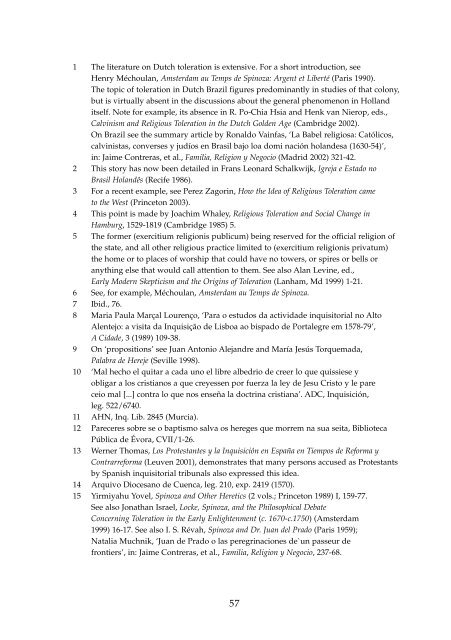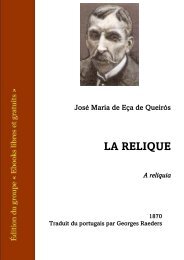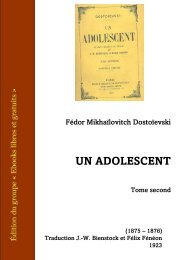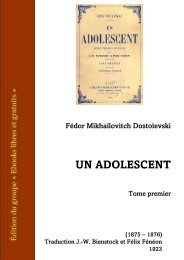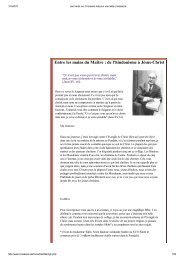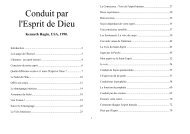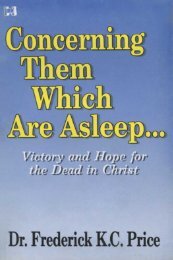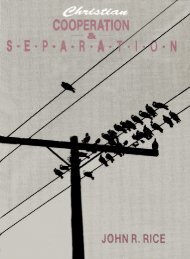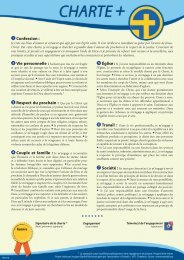The Expansion of tolerance
You also want an ePaper? Increase the reach of your titles
YUMPU automatically turns print PDFs into web optimized ePapers that Google loves.
1 <strong>The</strong> literature on Dutch toleration is extensive. For a short introduction, see<br />
Henry Méchoulan, Amsterdam au Temps de Spinoza: Argent et Liberté (Paris 1990).<br />
<strong>The</strong> topic <strong>of</strong> toleration in Dutch Brazil figures predominantly in studies <strong>of</strong> that colony,<br />
but is virtually absent in the discussions about the general phenomenon in Holland<br />
itself. Note for example, its absence in R. Po-Chia Hsia and Henk van Nierop, eds.,<br />
Calvinism and Religious Toleration in the Dutch Golden Age (Cambridge 2002).<br />
On Brazil see the summary article by Ronaldo Vainfas, ‘La Babel religiosa: Católicos,<br />
calvinistas, converses y judíos en Brasil bajo loa domi nación holandesa (1630-54)’,<br />
in: Jaime Contreras, et al., Familia, Religion y Negocio (Madrid 2002) 321-42.<br />
2 This story has now been detailed in Frans Leonard Schalkwijk, Igreja e Estado no<br />
Brasil Holandês (Recife 1986).<br />
3 For a recent example, see Perez Zagorin, How the Idea <strong>of</strong> Religious Toleration came<br />
to the West (Princeton 2003).<br />
4 This point is made by Joachim Whaley, Religious Toleration and Social Change in<br />
Hamburg, 1529-1819 (Cambridge 1985) 5.<br />
5 <strong>The</strong> former (exercitium religionis publicum) being reserved for the <strong>of</strong>ficial religion <strong>of</strong><br />
the state, and all other religious practice limited to (exercitium religionis privatum)<br />
the home or to places <strong>of</strong> worship that could have no towers, or spires or bells or<br />
anything else that would call attention to them. See also Alan Levine, ed.,<br />
Early Modern Skepticism and the Origins <strong>of</strong> Toleration (Lanham, Md 1999) 1-21.<br />
6 See, for example, Méchoulan, Amsterdam au Temps de Spinoza.<br />
7 Ibid., 76.<br />
8 Maria Paula Marçal Lourenço, ‘Para o estudos da actividade inquisitorial no Alto<br />
Alentejo: a visita da Inquisição de Lisboa ao bispado de Portalegre em 1578-79’,<br />
A Cidade, 3 (1989) 109-38.<br />
9 On ‘propositions’ see Juan Antonio Alejandre and María Jesús Torquemada,<br />
Palabra de Hereje (Seville 1998).<br />
10 ‘Mal hecho el quitar a cada uno el libre albedrio de creer lo que quissiese y<br />
obligar a los cristianos a que creyessen por fuerza la ley de Jesu Cristo y le pare<br />
ceio mal [...] contra lo que nos enseña la doctrina cristiana’. ADC, Inquisición,<br />
leg. 522/6740.<br />
11 AHN, Inq. Lib. 2845 (Murcia).<br />
12 Pareceres sobre se o baptismo salva os hereges que morrem na sua seita, Biblioteca<br />
Pública de Évora, CVII/1-26.<br />
13 Werner Thomas, Los Protestantes y la Inquisición en España en Tiempos de Reforma y<br />
Contrarreforma (Leuven 2001), demonstrates that many persons accused as Protestants<br />
by Spanish inquisitorial tribunals also expressed this idea.<br />
14 Arquivo Diocesano de Cuenca, leg. 210, exp. 2419 (1570).<br />
15 Yirmiyahu Yovel, Spinoza and Other Heretics (2 vols.; Princeton 1989) I, 159-77.<br />
See also Jonathan Israel, Locke, Spinoza, and the Philosophical Debate<br />
Concerning Toleration in the Early Enlightenment (c. 1670-c.1750) (Amsterdam<br />
1999) 16-17. See also I. S. Révah, Spinoza and Dr. Juan del Prado (Paris 1959);<br />
Natalia Muchnik, ‘Juan de Prado o las peregrinaciones de`un passeur de<br />
frontiers’, in: Jaime Contreras, et al., Familia, Religion y Negocio, 237-68.<br />
57


